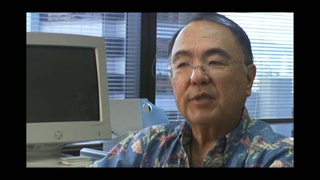Interviews
Feeling angry upon reading of Supreme Court case, 'Korematsu v. United States'
But when I read Korematsu was the first time that I really realized that not only had this happened to the Japanese American community, but that the highest court in the country had said that it was okay, which was a horrible realization because not only did a wrong occur to the community, but the Supreme Court, which is the highest authority in the land, said that it was well within the Constitution that this happened to the Japanese American community. And it made me very angry to read the case.
Date: March 23 & 24, 2000
Location: Washington, US
Interviewer: Margaret Chon, Alice Ito
Contributed by: Denshō: The Japanese American Legacy Project.
Explore More Videos

His testimony has more credibility because of his race
(1922 - 2005) Former U.S. Army counterintelligence officer

Different tension between East Coast and Los Angeles
Japanese American Creative designer living in Japan

Being an American soldier and an "enemy alien"
(1923-2011) Lawyer, MIS veteran, founder of Francis and Sarah Sogi Foundation

Not relating to Japan Americans' experiences on the mainland
(1923-2011) Lawyer, MIS veteran, founder of Francis and Sarah Sogi Foundation


Less information about Hawai‘i in mainland
(b.1944) Founder of Kobayashi Group, LLC

A teenager's memories of how a local newspaper misrepresented Japanese Americans
(b. 1925) Draft resister

The role of the media in influencing people's opinions
(b. 1925) Draft resister

Living conditions in prison while serving time for resisting the draft
(b. 1925) Draft resister

Talking to children about decision to resist the draft during World War II
(b. 1925) Draft resister

Reflecting on Japanese Americans' response to incarceration
(b. 1925) Draft resister


Reasons for conformity and competitiveness in Gardena, California
(b. 1946) Lawyer

Not fully understanding parents' World War II incarceration while growing up
(b. 1946) Lawyer

Role of the redress movement in helping Nisei to open up about their wartime experiences
(b. 1946) Lawyer
